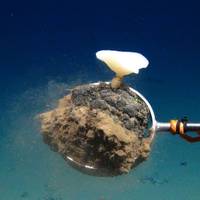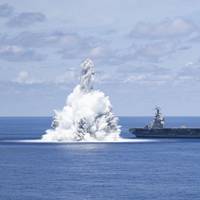Subsea Mining Plans Pit Renewable Energy Demand Against Ocean Life

As companies race to expand renewable energy and the batteries to store it, finding sufficient amounts of rare earth metals to build the technology is no easy feat. That’s leading mining companies to take a closer look at a largely unexplored frontier – the deep ocean seabed.A wealth of these metals can be found in manganese nodules that look like cobblestones scattered across wide areas of deep ocean seabed. But the fragile ecosystems deep in the oceans are little understood…
Video: USS Gerald R. Ford Completes Shock Trials

The U.S. Navy's new aircraft carrier USS Gerald R. Ford (CVN 78) on Monday underwent its third explosive event off the coast of Jacksonville, Fla., rounding out the ship’s Full Ship Shock Trials (FSST) and validating its shock hardness and ability to sustain operations in a simulated combat environment using live ordnance. During the four-month testing evolution, the first-in-class aircraft carrier withstood the impact of three 40,000-pound underwater blasts, released at distances…
EU-US Trade Deal on Course for This Year
EU and U.S. negotiators seeking a transatlantic free trade agreement expressed cautious optimism on Friday that they could resolve most issues by July, which could lead to a conclusion of a deal by the end of the year. The two sides are trying to agree on the Transatlantic Trade and Investment Partnership (TTIP), which supporters say could boost each economy by some $100 billion at a time of slowing growth in China and emerging markets. "We now have proposed texts in the vast majority of the negotiating areas... we are well into the nitty gritty of the negotiating process," Dan Mullaney, chief U.S. negotiator, told a news conference at the end of a 12th round of talks.
Chicago Tug Grounding: Latest Update
The U.S. Coast Guard informs it continues its response to the grounded towing vessel Kimberly Selvick in Lake Michigan off of Burnahm Park. It has been determined that ten times more diesel fuel, 14,000 gallons, is on board the tugboat than originally reported. Efforts to salvage the vessel are ongoing and weather conditions are delaying a pre-salvage damage assessment of the vessel and the staging of salvage assets. Until the weather improves, the Coast Guard will continue to work with the responsible party to ensure a salvage plan is prepared and ready for execution. “Recovering the vessel safely and mitigating potential impacts to the environment are the primary concerns for the planned salvage operation,” said Capt. Jason Neubauer, commanding officer of Marine Safety Unit Chicago.
Chicago Tug & Barge Grounding: Latest Update
The Coast Guard says it is continuing its response to the grounded towing vessel 'Kimberly Selvick' in Lake Michigan off of Burnahm Park.The vessel remains partially submerged, while the two barges that broke free from the tug Monday afternoon have been removed and towed to Calumet Harbor Fleeting. The vessel began taking on water and became partially submerged while trying to retrieve the two barges. Four people aboard the tug were evacuated by a rescue crew from the Chicago Fire Department Marine Unit. No injuries were reported. An overflight of the area revealed a 10-foot by 100-foot sheen near the vessel. Initial inspections indicated that the sheen was caused by small quantities of residual oil waste from the tug’s bilge and not from fuel onboard.
Canada's New Offshore Rules
According to a May 11 report from The Gazette, Canadian regulators relaxed offshore drilling regulations late last year, giving the energy industry more flexibility when putting in place safeguards against oil spills. Previously, companies were required to install specific kinds of equipment. The old regulations outlined everything from how companies should cement the casing on an oil well, to how they should conduct pressure tests. Under the new regulations, which came into force in December, well operators must set environmental-protection goals, list the equipment they will use to achieve those goals and disclose their plans for inspecting, testing and maintaining such gear. They are not required to install any specific equipment. (Source: The Gazette)





